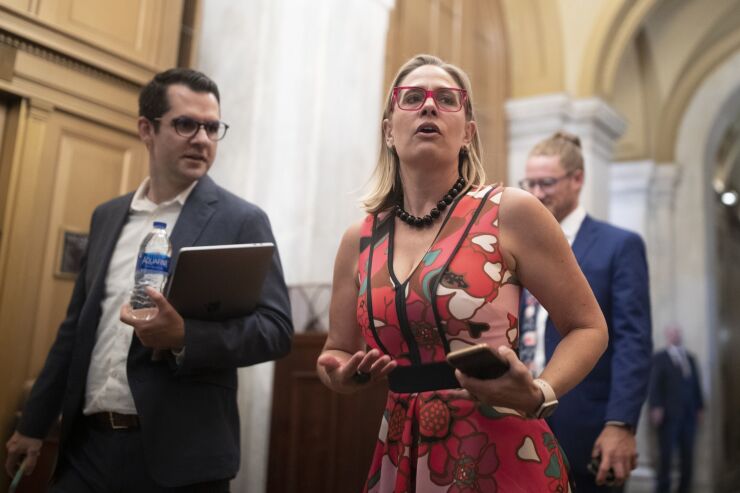Senators negotiating the terms of a $579 billion infrastructure plan chipped away at some of the issues that had been holding up an agreement but have yet to find a breakthrough on other differences that would seal an agreement and lead to a vote on legislation.
The negotiations have blown past several deadlines despite persistent expressions of optimism from lawmakers in both parties that they were close to an agreement. Senate Majority Leader Chuck Schumer of New York has warned that he’ll keep the Senate in session through the weekend if necessary.
President Joe Biden also has been engaged in the effort to strike a deal. He met Tuesday with Senator Kyrsten Sinema of Arizona, the lead Democratic negotiator in the infrastructure talks as Democrats and Republicans wrangled over funding for mass transit and details about an extension of broadband access. A dispute over spending levels on water projects appeared to be resolved, according to Senator Mitt Romney, a Utah Republican, and Jon Tester, a Montana Democrat.

“Both feel optimistic about the path forward and clearly both understand having lived through many iterations of legislating and negotiating before that it is always at the tail end when you have some of the trickiest discussions,” White House Press Secretary Jen Psaki said of Biden and Sinema.
The lead Republican negotiator, Ohio Senator Rob Portman, also has been involved in talks with White House officials.
“There will always, always be details that have to be worked out, but I’m pretty optimistic at this stage,” said Romney, a member of the bipartisan group. “Nothing’s 100%, but it looks pretty good.”
Schumer said the two sides continue to close the gap on the outstanding items. “We’re getting close and I hope we can get this done soon,” he said.
One of the main disputes is over how to divide money from the highway trust fund between roads and transit. Democrats want 20% to go to transit and GOP lawmakers want a smaller portion. Some Republicans have argued that, given the large boost in the bill for transit, future highway trust fund disbursement for that area should be reduced to 18% from 20%. Democrats say the traditional 20% share of the trust fund, which is primarily financed by the gasoline tax, should be maintained.
“Transit is certainly a major issue,” Senator Susan Collins of Maine, one of the GOP members of the group, said. “Republicans have made an extraordinarily generous transit offer that, when you add everything together, it’s like an 83% increase, which is unlike anything we’ve ever seen.”
On another obstacle, Republicans said they were concerned that some of the language Democrats have proposed on broadband could open the door to letting the Federal Communications Commission impose rate regulations on providers.
South Dakota Senator John Thune, the chamber’s second-ranking Republican, said the issues being raised on broadband have led to “a good amount of consternation among our members, but I think those are all fixable.”
There also are differences over a Republican attempt to waive Davis-Bacon Act requirements that federally funded projects pay wages commensurate with local prevailing levels. Republicans say Democrats in the negotiating group already agreed to exclude Davis-Bacon requirements from the deal and other Democrats are reneging.
The negotiators also are wrangling over how to count funding that is left over from programs originally part of the federal response to the coronavirus pandemic. Collins said it’s been difficult to get a clear accounting of how much money might be available.
— With assistance from Jennifer Epstein, Laura Litvan and Steven T. Dennis





